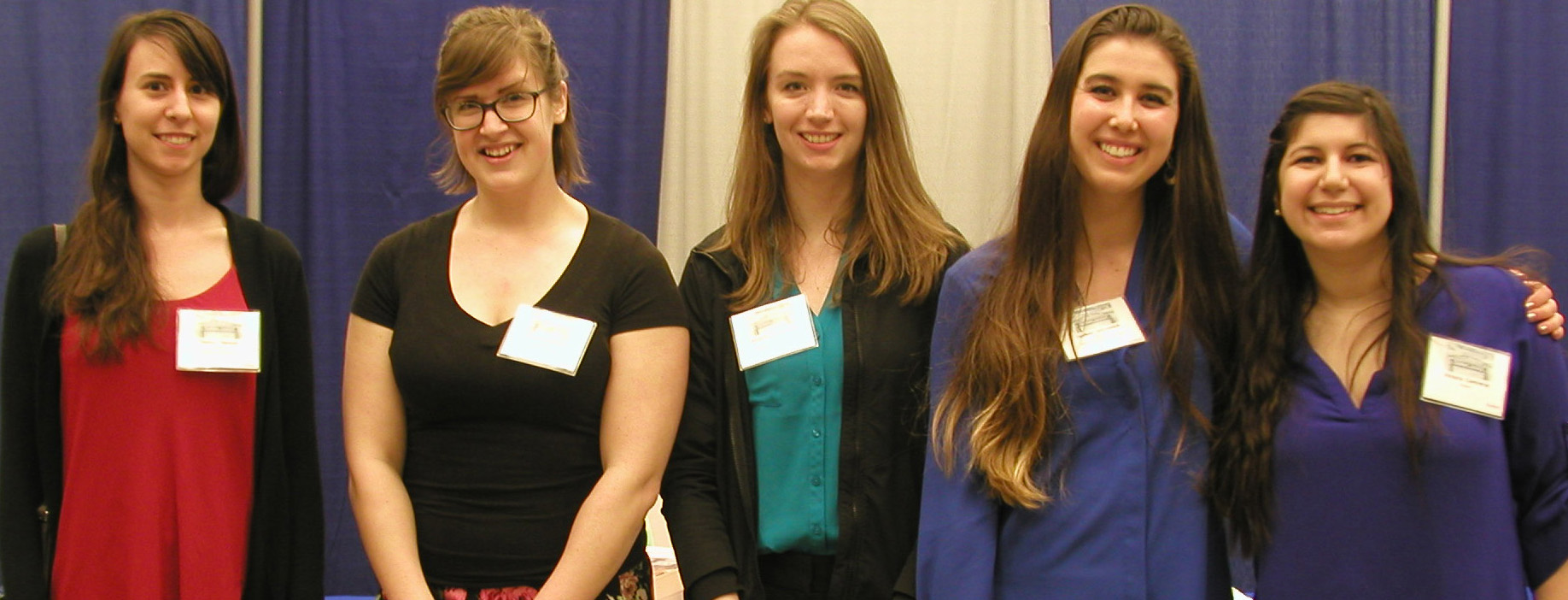As departments within the University of Minnesota College of Pharmacy, we are incredibly grateful for the many ways our alumni engage with our community to support students and advance the science and professions of Medical Laboratory Science, Occupational Therapy, and Pharmacy. View the Celebrating our Alumni page to see highlights from some of our alumni.
Mary Colson-Burns
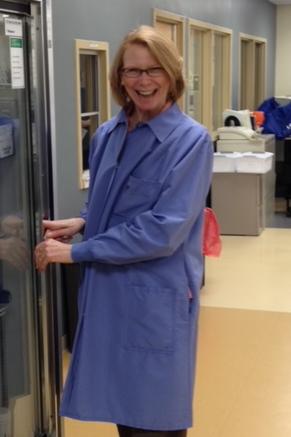
Mary Colson-Burns is a consummate professional held in high esteem by her colleagues in the Medical Laboratory Sciences (MLS) field. Mary’s knowledge and expertise, her understanding of the critical importance of the field, her passions for learning and for MLS, as well as her philanthropic history, have resulted in Mary’s partnership with the University of Minnesota to create a scholarship program for MLS students.
Mary received her medical technology degree in 1975 from Mankato State University. After graduation, she began her 45 year career within the Medical Laboratory Sciences field by working her first 20 years at United Hospital and the remaining 25 years within Allina Health Laboratory after the consolidation of the United Hospital and Abbott-Northwestern Hospital laboratories.
Mary’s dual passions for learning and for excellence led her to pursue an American Society for Clinical Pathology (ASCP) specialty in microbiology in 1983 while continuing full time employment at United Hospital. It is noteworthy that Mary strongly encourages obtaining an MLS specialty certification, recognizing that the additional certification not only expands knowledge in a particular field, but also advances career potential.
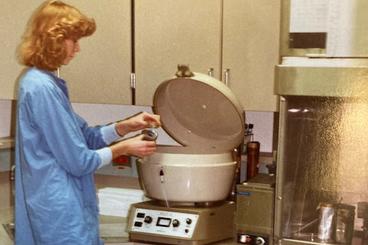
Consistent with her goal of continuous learning, in 1987, Mary chose to pursue a life-long dream by enrolling in the William Mitchell School of Law. While continuing full time employment at United Hospital, she completed the four year night school program and obtained her law degree in 1991, graduating magna cum laude. Subsequent to obtaining her law degree, and still employed at United Hospital, Mary began working for a law firm doing research and volunteering at Legal Aid in Ramsey County. While Mary valued her experiences during the practice of law, she realized that her love for the lab greatly surpassed her interest in the law so she discontinued pursuit of a legal career, choosing to focus on her MLS career instead. In 2001, Mary became an Associate Professor at St. Mary’s University, teaching an evening course in microbiology to Surgical Technology students.
Mary continued her MLS career within the Allina Central laboratory, advancing through the positions of lead technologist, supervisor, manager, and microbiology technical specialist until her retirement in 2020. Mary was an esteemed colleague and a trusted resource within her medical community; valued for her expertise, work ethic, and commitment to excellence. She served on numerous committees, including infectious disease, pharmacy, and laboratory planning committees.
During Mary’s 45 year career, she gained an extensive understanding of the MLS field and the many roles that MLS graduates can fulfill. Mary says, "I think of MLS as a combination of science and art. You have to have a vast knowledge base, critical thinking skills, and a broad view to really understand what you’re doing in the laboratory."
Mary’s passion for the MLS field shines through her work history and through conversation with her. When asked how she became so good at her profession, she said it was, "because I loved the work, I was always challenged, I never stopped learning, and I was focused on getting the job done right."
For anyone considering an MLS degree, or for those currently enrolled in the program, Mary leaves this advice: "Make an effort to learn as much as you can throughout your career. Learn every day. That’s what makes it a profession instead of a job; to actually put effort into learning as much as you can and to care about the work you are doing and its impact on your patients."
With her extensive experience and comprehensive understanding of the MLS profession, Mary recognizes it is essential to continue to foster future students and professionals in MLS programs. Mary comments that diagnosticians cannot diagnose without skilled professionals doing the lab work. It is a critical piece to patient care that often gets missed by the general public because it is behind the scenes. But this profession is more than just putting samples into a machine. It takes talented, critical thinkers who can analyze data, troubleshoot issues, and report accurate results. Therefore, it is imperative to support the field and individuals who will one day undertake that work.
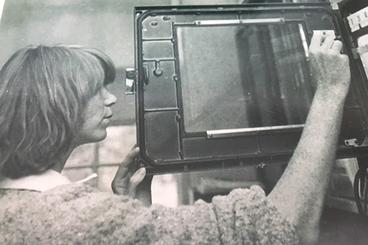
While teaching, Mary was always thrilled to work with University of Minnesota students, "I never worried about their ability to excel." She consistently noted that UMN students had critically strong theoretical background knowledge, which made them stand out. It was clear that not all students came in with this knowledge, which shows how well-rounded the MLS program prepares their students. She notes, "Students who have this theoretical knowledge excel not only in the lab, but have the opportunity for more diverse career options."
Although Mary is not an alumni of the University of Minnesota, she is very passionate about supporting this MLS program in particular. She remarks, “The program is noteworthy due to the robust, established, and successful coursework, and because the students who come out of this program are successful. If we are going to ensure future lab scientists, this is the program that needs to be supported.”
Because of her passion for - and commitment to - the MLS field, Mary created a scholarship fund for students entering into the MLS program at the University of Minnesota. This fund is aimed at promoting the MLS program and providing aid to students who might not otherwise have the opportunity to enroll.
Ann Claesgens, Class of 1968
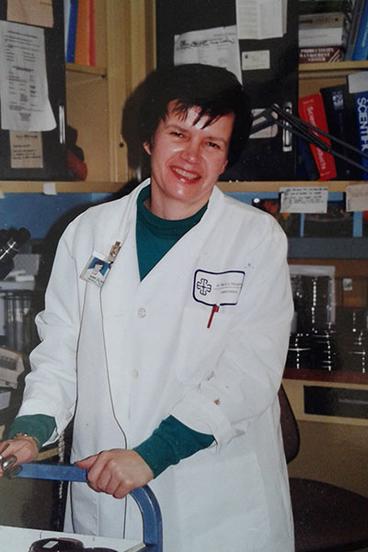
Ann Claesgens has the kind of career story you don’t hear much about anymore.
The number of different workplaces that spanned her 45(+) year career?
Two: Less than a year at the University of Minnesota Hospital, and the rest at St. Mary’s Hospital in San Francisco, in her capacity as a medical laboratory scientist.
Ann graduated from the University of Minnesota’s Medical Laboratory Sciences (MLS) program in 1968 (known at the time as Medical Technology), a field to which she finally committed after contemplating careers as a veterinarian, then archeologist, then teacher. Her classes spanned the spectrum of liberal arts studies, including art history, music appreciation, and ancient history.
When she finally committed to medical laboratory sciences, she was fully invested, as evidenced by the tenacity she displayed catching up to the required curriculum, working a job drawing blood early in the morning before classes, then muscling through her post-graduation job at the University of Minnesota Hospital’s medical laboratory.
“I worked the night shift, the third shift, the graveyard shift four nights a week from 10 at night to 8 in the morning,” she said. “It was down in the basement”.
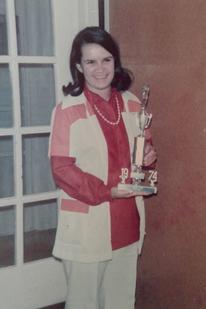
She did take time off to drive to California during February with a co-worker from the 2nd shift whose husband was returning to a military base after serving overseas. Something struck her when she visited San Francisco, that would have a lasting impact on her life moving forward. “There was no snow,” she says. “What can I tell you?”
Ann’s love for the Bay area convinced her to return there soon after that visit, and then, she says, her professional future was sealed. “I spent the rest of my career at St. Mary’s Hospital and Medical Center in San Francisco.”
Ann worked in a lab the entirety of her tenure at St. Mary’s, but that’s not to say her stay was stagnant. Her University of Minnesota MLS education and her passion to help patients through laboratory diagnostics led her to apply her background within numerous areas, including chemistry, radio immunoassays (or RIAs, for running special tests, such as those on the thyroid, and drug testing) and microbiology. She also served as the education coordinator of St. Mary’s medical technology program, scheduling lab rotations for six students per year throughout the organization.
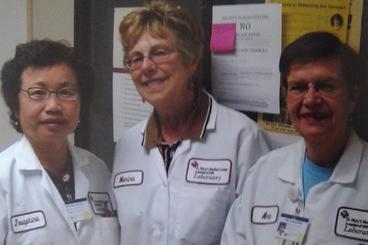
“I was very confident when I left the University of Minnesota. I knew I had been at one of the top programs in the country. Having been a new graduate and becoming an education coordinator, it wasn’t overwhelming. I was ready to face the world. I still feel good about the U of M program.”
Ann’s goodwill and gratitude toward the University of Minnesota’s Medical Laboratory Sciences program has engaged her in another decades-long endeavor. For almost 30 years she’s donated to the program.
“I like to give to the program because it provided me with a wonderful career, a good retirement, and people are needed in the labs these days,” she says. “For students today and in the future, I want to help them continue their education. It’s payback time.”
Galina Dronova, Class of 2014
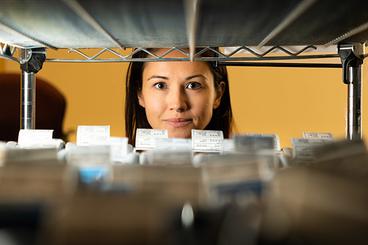
Ten years ago, Galina Dronova, newly graduated from the University of Minnesota with a bachelor’s degree in Microbiology, experienced the first of two encounters that would inform and indelibly alter her career.
The first occurred as she sat in a clinic lab for a blood draw, and came to the same conclusion she had many times before, in this environment: that she would find her true professional passion somewhere within a laboratory’s walls.
“Every time I went to get my blood drawn, I would see a laboratory and ask, how can I work there? I was just interested in the clinical field,” she says.
This calling inspired Galina to enroll in the University’s Medical Laboratory Sciences (MLS) program and to graduate with a second bachelor’s degree, this in MLS.
“The program really stirred me,” she says. “It provided a direct application. You are a certified member of health care.”
Park Nicollet hired Galina to work in its laboratory as a medical laboratory scientist, preparing and analyzing lab specimens, so care teams could diagnose and treat illnesses. She ascended to become team lead. And then, the health system instituted a change that for a second time would steer her professional path in a direction she never anticipated. It recruited her to a temporary role, as it integrated a new lab information system (LIS) called Epic Beaker into its electronic health record platform. Her job was to teach and train others in the lab, how to enter lab data into the system and troubleshoot technology problems.
Following the Epic Beaker implementation, a full-time role developed to assist Health Partners’ Principal Trainer as a Learning Specialist, and Galina took it.
At about that time and across town, a major development was underway within the region’s health care ecosystem. Fairview Health Services (now MHealth Fairview) and HealthEast had initiated a merger. The simple premise was that the combined entity would expand access to health care throughout the Twin Cities and provide value to patients.
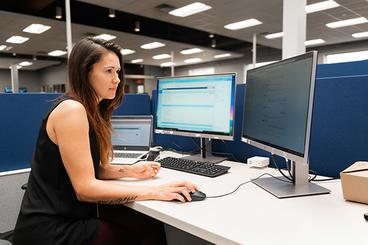
But like many integrations, executing this vision meant managing through myriad complexities. It would involve merging Fairview’s seven hospitals and multiple primary care clinics, and HealthEast’s four hospitals and its clinics, into one system.
This included the massive task of combining the IT platforms that support the two entities’ medical laboratories, into one. And that involved finding a Principal Trainer to teach laboratorians across the system how to use Epic Beaker as MHealth Fairview’s new LIS and integrate it with the Epic Beaker platform that HealthEast already uses.
Galina accepted MHealth Fairview’s offer to step up to the role.
“I was so conflicted because I love this line of work, but I also loved working directly in the lab,” she says.
The “work” that Galina’s role involves, is to ensure that every MHealth Fairview laboratory professional is fluent on the new LIS leading up to and following the integrated system’s planned go-live date in July, and that they know the system well enough to troubleshoot problems.
To do this, she needed to design a training plan and set in motion a workforce involving credentialled trainers, who train “power users”, who train the “end users”, the laboratorians throughout the MHealth Fairview-HealthEast system, who will be entering the laboratory data into the electronic record.
There are 1,300 laboratory practitioners within the MHealth Fairview system, alone.
“One of the most exciting things about this go-live is that currently we’re one system but we don’t operate on the same lab information system,” Galina says. “It’s going to be a lot easier to track the movement of that specimen from location A to location B because now you’ve built that bridge between the two lab information systems.”
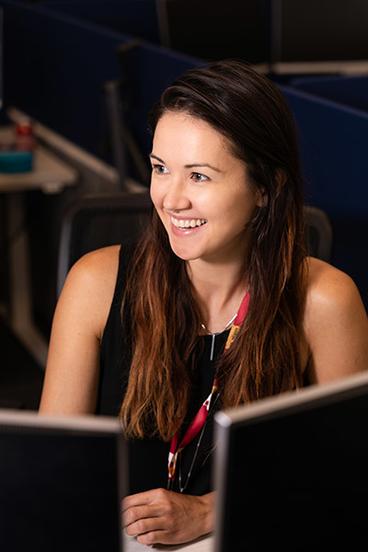
In effect, the contributions of Galina and her team will make it easier for care teams to access a patient’s lab results regardless of where, within MHealth-Fairview/HealthEast the patient received care, where the patient’s lab sample was taken, and where that specimen was analyzed. The patient will receive results and a corresponding care diagnosis and care plan quicker, as a result.
This allows Galina to continue to feel connected to the laboratory and the people it serves, despite leading a function that moved her away from direct specimen testing.
“I’m technically a part of the health information technology learning development department, but most of my day is actually spent with lab operation, working with laboratory leaders to understand what their needs are,” she says. “If I can teach with the joy and teach the curiosity to empower the user to provide the most efficient workflow or find the information, then I’ve done my job.”
She is equipped to thrive in this role, she says, because of the teaching she received within the University of Minnesota’s MLS program.
“At the University of Minnesota, they don’t just train laboratorians, they train leaders. They teach you high level synthesis problem solving skills, teamwork and the importance of collaboration. They give you the passion and drive to make this degree whatever you want it to be,” Galina says. “That’s not something that’s written in a textbook, that’s semesters of the culturing of a person. Where I am today is 100 percent a derivative of what the MLS program has done for me.”
Hannah Jeffers, Class of 2019
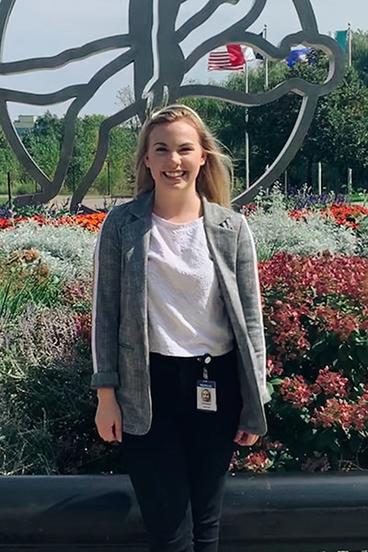
Not every student who graduates from college receives hands on experience conducting enzyme-linked immunosorbent assays (ELISAs), but as a University of Minnesota Medical Laboratory Sciences (MLS) program graduate, Hannah Jeffers did. That, along with the overall education she cultivated in the program, caught the interest of medical device maker Medtronic.
Medtronic had written to the program about an internship opportunity during Hannah’s senior year. She was quick to apply. “They were looking for someone with an MLS background who had worked with ELISA methods,” she says. “I was like ‘this sounds perfect’. I really wanted to be somewhere that’s super hands on.” The hiring manager replied, “OK, when can you start?”
The 2019 MLS program graduate interned at Medtronic from May to September of her senior year, prior to fulfilling the MLS program’s clinical rotation requirements at a lab and two hospitals, where she focused on microbiology, clinical chemistry, hematology and blood banking, respectively. Following graduation, Medtronic hired Hannah full time to work in its blood laboratory.
Her role there is to draw human blood and test it against the company’s devices to see if there’s an adverse outcome, like clotting or hemolysis. She conducts her tests in a lab setting – not on people or animals – to give the company an early sense as to whether the devices are safe before they advance to animal studies or clinical trials.
“I feel very grateful that I was able to get this position,” she says. “I’m able to help people every day, even if it’s not in the typical MLS sense.”
The University of Minnesota’s MLS program equips graduates to work within myriad fields and organizations. For example, Hannah says other classmates from the program work in states such as Oregon and Utah, in settings like microbiology and commercial laboratories. “The MLS program is rigorous, but it prepares you so well,” she says. “A friend who graduated with me wanted to be a generalist. She was like ‘I want to do everything, I just want to help in every way that I can.’”
The program sent Hannah out to succeed within the exacting and meticulous framework and standards of a company whose mission is ‘to alleviate pain, restore health, and extend life’. “This program prepared me for anything. I felt very prepared for the boards, and just really prepared for everything even if I didn’t come to Medtronic,” she says.
Yet soon after she ventured out, Hannah was drawn back, to contribute to the program that left a profound imprint on her professional path. She agreed to lead a virtual clinical rotation for current MLS students who are interested in the work she conducts.
“It makes me happy,” she said. “I hope people were inspired.”
Fran Lebahn, Class of 1974
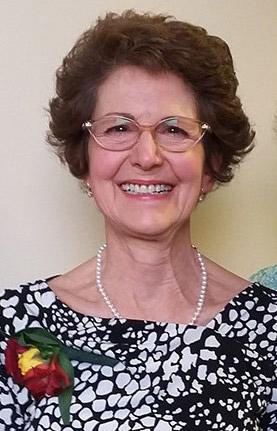
In 2020, as was the case in the 1970s, few people who visited a doctor or a lab knew what happened to the lab specimens they provided and left behind. Then, as now, a medical laboratory scientist worked behind the scenes to review the sample, analyze the results and report it to doctor as the basis for creating an appropriate care plan.
“Without medical laboratory scientists, your doctor wouldn’t know what to do,” says Fran Lebahn, who entered the workforce as a medical laboratory scientist after she graduated from the University of Minnesota’s MLS program (then called Medical Technology) in 1974.
But getting credit for the essential role that medical laboratory scientists play in promoting better health care matters far less to Fran than ensuring that there’s a robust pipeline of these professionals to staff the health care teams that depend on them. And to do that, she says, it’s critical to envision the college student who’s trying but struggling to gather the resources to cultivate an MLS education.
“It breaks my heart. It really does,” she says. “I am so grateful for my education at the University of Minnesota. I was fortunate to receive some scholarships to go to college. It was a gift. I’ve been fortunate in being able to go beyond the laboratory because of my education at the U.”
Fran worked in the VA Hospital’s microbiology lab after she graduated from the MLS program, and then at the Ob-Gyn Lab in Powell Hall and the Phillips-Wangensteen Building. She built upon the base of her University education, enrolling in masters classes in the College of Food Science and Nutrition. She eventually started her own business, catering desserts and teaching cooking classes.
Fran later returned to her MLS roots to work as a microbiologist, teaching specialist, a clinical research coordinator and a lab medicine and pathology education coordinator.
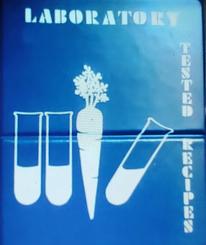
Along the way, she continued to respond to the calling within her, to provide access to others whose futures could begin with a University of Minnesota education. One way was to combine her two areas of expertise – MLS and Food Science – to create a cookbook (titled Laboratory Tested Recipes) comprised of recipes that MLS graduates from throughout the Twin Cities contributed. Fran, then a member of the Med Tech Alumni Board, embarked on the effort to raise money for students to attend the University’s MLS program. The book sold like hot cakes when it first appeared at the 1993 annual alumni dinner and many more books were also sold at subsequent banquets and student bake sales.
Fran also committed to contributing directly to MLS program, which makes numerous scholarships available for students who seek to pursue the degree.
“I think its important to make education available to anyone who wants it. Education is your key to being able to do whatever you want to do in life,” she says. “I like the idea of giving back and making that available in any way I can. If students need to supplement what they have, lets help them out.”
Toni Okada, Class of 1968
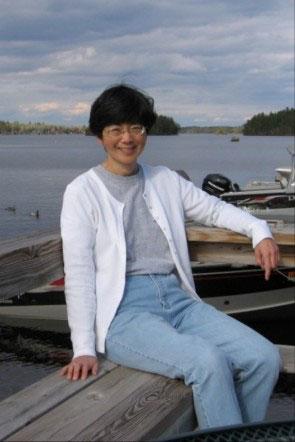
My grandfathers came to the US from Japan in the early 1900’s to work on the railroads. They eventually sent for their brides and settled on the West Coast. After Pearl Harbor and Executive Order 9066, both families were incarcerated at the Tule Lake War Relocation Camp in California, and that’s how my parents met. Dad volunteered for the Army to get out of the camp and knew enough Japanese to qualify for the Army Military Intelligence Service (MIS) Japanese Language School. The school was in San Francisco but relocated to Minnesota (Camp Savage) when Minnesota Governor, Harold Stassen, and Mayor of Minneapolis, Hubert Humphrey, said they would welcome the Japanese Americans to Minnesota. The school later moved to Fort Snelling. Dad remained stationed there during World War Two. He was a radio operator and intercepted information from Japan and gave it to the students to translate. When Dad asked Mom to marry him, Mom was able to find a sponsor and a job in Minneapolis, so she also was able to leave Tule Lake.
After the war, my parents decided to settle in Minneapolis where they had been welcomed, rather than return to the discrimination they knew they would face on the West Coast. The rest of the family members on both sides followed my parents to Minneapolis when the camps closed.
So I grew up in Minneapolis, the only Asian American in my grade at school. When it came time to decide about college, I figured I would be going, just like all of my friends. Even though dad didn’t think girls needed to attend college, luckily for me, a family friend was a University of Minnesota professor and convinced him I should go. I worked summers and commuted to the U from home until my senior year when I shared a house near campus with four college classmates.
I started college thinking I would be a nurse, like my Aunt Grace. At that time, women were encouraged to be teachers or nurses. I volunteered at St. Mary’s Hospital as a “candy striper” and one day had an opportunity to visit the laboratory. I was fascinated by the instruments and what they could do, and I changed my major to medical technology (now medical laboratory science). Our program involved a full year of rotations in all the departments, including working the night shift at the University Hospital Laboratory (now MHealth Fairview), and we had an option for a rotation doing a research project. I also worked as a phlebotomist before our rotation hours. We were very well prepared to work in the lab following graduation!
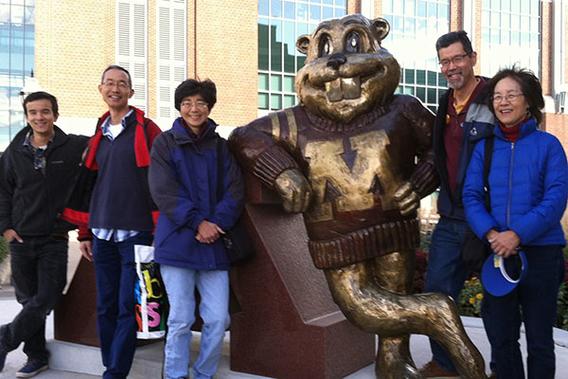
I joined the staff as a technologist in chemistry at the University of Minnesota Hospital laboratory and worked there for seven years. I had the opportunity to assist with the medical technology student program during that time. I also changed jobs and worked with one of the pathologists doing method development. In those days, we made our own reagents for various automated instruments, so I learned how to do method validation studies.
When the pathologist I was working for moved to Portland, Oregon, he asked if I would like a job there at Good Samaritan Hospital. Dad was born in Portland and grew up on a farm outside of Vancouver, WA. By this time, my grandparents and cousins were in Seattle, so I had family in the area. I decided to move and continued to do research for the pathologist. This included doing research at the Primate Center and developing a cumulative laboratory report (in the days before computers were used for reporting).
After three years in Portland, I moved to Seattle. The clinical chemist from Good Samaritan had a chemist friend at Swedish Hospital Laboratory and I was able to get a job there, working as a toxicology technologist. When an education and safety coordinator position opened up, I applied and was accepted. I became the Medical Technology Program Director which was one of my favorite jobs. We had a medical technology program for six students who already had a bachelor’s degree. They spent a full year rotating through the various departments. Our clinical chemists, technologists, and pathologists gave the lectures. I wrote objectives and tests and did student evaluations. Each year’s class had different personalities and it was amazing to watch the transformation from students who hadn’t been in a clinical laboratory before, to graduates who were very well prepared to step into the workforce.
The Swedish lab changed owners a few times, but I was with the same group of people for 26 years. When the medical technology program closed, my job became quality assurance and safety coordinator, and then later I became the chemistry supervisor. The lab was a full-service laboratory and frequently had new instruments to evaluate, something I still loved to do. Through a colleague in our city-wide Quality Assurance Focus Group, I found out about an opportunity for a lab manager position at Overlake Hospital in Bellevue. Although that position was eliminated shortly after I arrived, I accepted the chemistry supervisor position. During my time at Overlake, we totally remodeled the lab and installed an automated processing line which was very well received. It was great to be part of a major improvement that made everyone’s job easier.
I was at Overlake for three years and then moved next door to Group Health (now Kaiser Permanente) and became lab manager for the clinic’s stat lab. I had not managed areas other than chemistry, so this was a good learning experience. My time in educational programs had reinforced what we learned in the University of Minnesota’s Medical Technology program, and continuing education programs had allowed me to be familiar with the different specialties. The clinic setting was different from hospital labs, and besides the lab work, I learned about phlebotomy, EKGs, and point of care testing. There was more interaction with people from different departments, which was great. They came to know more about the laboratory, and I found out what their perspective was on our service.
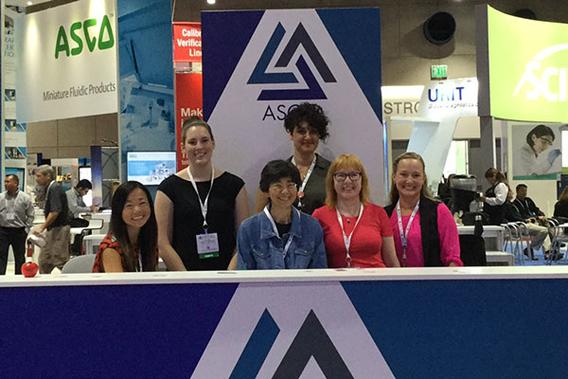
Although I retired in 2014, I do keep busy volunteering and remain active with the professional organization, ASCLS, as I have been ever since the beginning of my career. I currently represent Region IX on the ASCLS Government Affairs Committee. It is important for all of us to advocate for our profession both to the legislature and the general public. Our medical technology class has kept in touch through our newsletter and get-togethers. This past year, a few of us have participated in Zoom calls to check in with each other during the pandemic. Friendships made during college have lasted more than 50 years!
I continue to support the MLS Program and my father, grateful to the University for educating my brother and me, asked us to donate a portion of his estate to the U.
As you can see from my career, there are many opportunities that become available with your experience. Others in my class went into different specialties, joined the IT department, went on to medical school and law school, and became accountants. A good education, like the one I received, can open up numerous possibilities!
Mallory J. Yelenich-Huss, Class of 2009
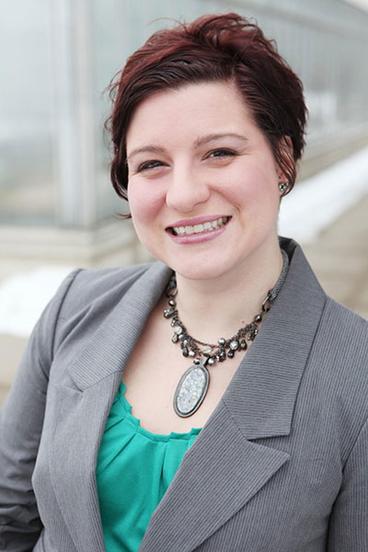
Wow, talk about someone who has really done it all! Meet Mallory J. Yelenich-Huss, M.D.
After completing her BA in Behavioral Neuroscience - Psychology, Mallory applied to medical school. Although she was initially not accepted into medical school, she knew she still wanted to work in the health sciences. Wanting to get more experience, she pursued a position as a surgical aide at Regions Hospital for the next three years.
During her time in that role, she continued working on her medical school application and actively networked with professionals across a number of positions at the hospital. She asked critical questions to find another profession she would enjoy, in the event she would not be accepted into medical school. One day, while bringing specimens to the pathology lab, she asked her colleagues in that department about their degree and how they achieved their current positions. Finding their work fascinating, she learned more about laboratory science degrees, and decided to apply to what was then called the Clinical Laboratory Sciences program, now the Medical Laboratory Sciences Program at the University of Minnesota.
Dr. Yelenich-Huss describes her time in the MLS program as an incredible learning experience which set her up to later reapply for medical school. She notes how instrumental the MLS background was for her acceptance into the University of Minnesota Medical School, and her success in becoming the surgeon she is today.
After graduating with a BS in Clinical Laboratory Science in 2009, she worked in a clinical lab at Fairview University Hospital for 6 months, and then began medical school. From there, she did her surgical residency at the University of North Dakota, then matched with the Breast Surgery Oncology Fellowship in Dallas at Baylor University Medical Center. Today, she is a successful attending as a Breast Surgical Oncologist, and Specialist in General Surgery in Maple Grove, MN.
While Dr. Yelenich-Huss has pursued additional steps in her medical career, she affirms her love and appreciation for her MLS degree, and states that she absolutely could have seen herself staying in that field for her whole career. She enjoys the nature of solving problems, practicing applied science, working with her hands, and answering questions only someone with MLS knowledge can. She credits the MLS degree in giving her a solid foundation, with many transferable skills, which has allowed her to be the well-rounded doctor she is today.
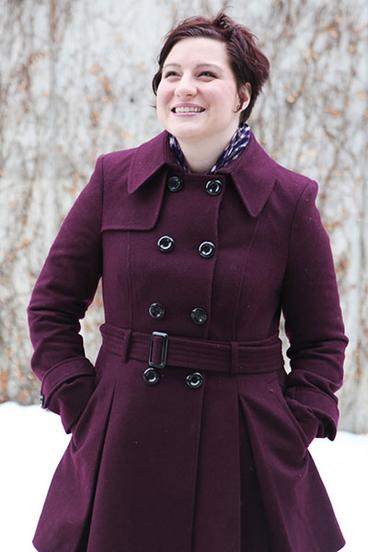
For those thinking about a career in MLS, Dr. Yelenich-Huss recognizes how instrumental this degree is for those who want to work in applied science. This degree can absolutely be used as a stepping stone if you are looking for a path into other health sciences. At the same time, this degree is also an excellent stand-alone profession. There is an endless list of ways an MLS graduate can utilize their degree, but to name a select few, one may get into: laboratory management, teaching, working in specialty labs, microbiology & pathology labs, blood banking, working with the Department of Health, and other public health related fields. She notes, “It really is hard to say only one profession, and it can be hard to define, as the opportunities are so broad.”
Naming some of the significant takeaways from her experience as an MLS student, she recounts the long lasting friendships and professional relationships she has built. For students entering the program, she highlights how impactful the small class sizes are, and that the core classes are grouped together with the same students. This led to a tight-knit group of peers and future colleagues who held study groups, worked together, solved problems, and through it all, became lifelong friends. The program gave her the opportunity to both learn from and teach her peers; in turn, making her a better student and future surgeon. The small class sizes also created a welcoming environment to connect with professors, ask questions, and find needed support within the program. Mallory is still very connected to her peers and professors, and maintains friendships with many to this day.
The overarching theme to Dr. Yelenich-Huss’ interview is this: the MLS degree is an incredibly diverse and exciting career with endless opportunities in a wide range of fields. There is always a need for professionals in MLS. Further, if you are someone interested in this field, and the health sciences, you can absolutely begin your training and education with MLS, and use the transferable skills to pursue further education. The MLS degree is an outstanding program, and she encourages you to explore what this degree could mean for you!
